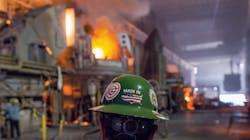To be clear: The leaders of prominent steel manufacturers Cleveland-Cliffs Inc., Nucor Corp. and Steel Dynamics Inc. are among the many automotive sector players crossing their fingers for a speedy resolution to the United Auto Workers’ strike of the Big Three. But in comments to analysts and investors this week, each also outlined reasons why they’re not gnawing their fingernails.
Following up on their team’s third-quarter earnings report, Cleveland-Cliffs Chairman, President and CEO Lourenco Goncalves pointed out that the company’s shipments to automotive customers rose to a record during the period as part of total volumes that topped 4 million tons. Key to the auto strength: A majority of Cleveland-Cliffs’ client base in the sector are manufacturers beyond the Big Three.
“In fact, we have seen much better demand from these other automakers,” Goncalves said. “As a result, we expect total shipments in Q4 to remain around the 4 million net ton mark, even if the UAW strike continues for a while.”
That confidence in the fourth quarter doesn’t mean auto volumes aren’t suffering, though. Goncalves said the UAW’s stoppages—with GM workers in Arlington, Texas, walking off the job Oct. 24, the strike now comprises 45,000 people—are having an effect on Q4 volumes. But Cleveland-Cliffs is, as of this week, facing impacts that are “less significant than what we felt from the microchip shortage and other supply chain issues the entire automotive sector went through in 2021 and 2022.”
Also helping Cleveland-Cliffs this quarter is a shift in product mix: The company’s service center customers are back buying after being very cautious during the third quarter, its business with the military is going great guns and contracts related to infrastructure and energy transition investments are growing in numbers.
Another executive finding silver linings in the UAW strike was Mark Millett, chairman and CEO of Steel Dynamics. On the heels of reporting Q3 results, Millett noted that Steel Dynamics’ auto exposure in flat-rolled steel skews toward European and Asian manufacturers but added that the company’s engineered bar division is more exposed to domestic OEMs.
“The outlook for the remainder of the year is somewhat opaque,” Millett said before spinning the story forward into 2024. “Dealer inventories remain below historical norms, which will be further reduced by the ongoing strike. […] And with tight supply, the auto build rate will likely be higher than the already anticipated 16 million units-plus for 2024.”
At Nucor, where auto customers account for about 6% of business, Chairman, President and CEO Leon Topalian also is taking a longer-term view. He and his team have set themselves a target of doubling production for car companies to 3 million tons annually by 2028. With that in mind, the UAW strike is more a hiccup than something more painful.
“There’s a lot of demand out there,” Topalian told analysts Oct. 24. “Hopefully, we can get back on track and continue to supply into that market.”
Investors appeared to take to heart executives’ explanations and observations, pushing up shares of all three companies on Oct. 24. Over the past six months, however, the stocks are all flat or slightly down.
About the Author
Geert De Lombaerde
Senior Editor
A native of Belgium, Geert De Lombaerde has been in business journalism since the mid-1990s and writes about public companies, markets and economic trends for Endeavor Business Media publications, focusing on IndustryWeek, FleetOwner, Oil & Gas Journal, T&D World and Healthcare Innovation. He also curates the twice-monthly Market Moves Strategy newsletter that showcases Endeavor stories on strategy, leadership and investment and contributes to other Market Moves newsletters.
With a degree in journalism from the University of Missouri, he began his reporting career at the Business Courier in Cincinnati in 1997, initially covering retail and the courts before shifting to banking, insurance and investing. He later was managing editor and editor of the Nashville Business Journal before being named editor of the Nashville Post in early 2008. He led a team that helped grow the Post's online traffic more than fivefold before joining Endeavor in September 2021.
